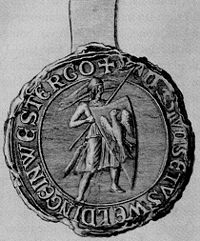
Magnus Forteman
Encyclopedia

Friesland
Friesland is a province in the north of the Netherlands and part of the ancient region of Frisia.Until the end of 1996, the province bore Friesland as its official name. In 1997 this Dutch name lost its official status to the Frisian Fryslân...
which is now a province of Netherlands
Netherlands
The Netherlands is a constituent country of the Kingdom of the Netherlands, located mainly in North-West Europe and with several islands in the Caribbean. Mainland Netherlands borders the North Sea to the north and west, Belgium to the south, and Germany to the east, and shares maritime borders...
. His existence is based on a sage's writings.
According to this saga he was the first of the 17 potestates of Friesland in the period after the Kings of Friesland, a period of Charlemagne
Charlemagne
Charlemagne was King of the Franks from 768 and Emperor of the Romans from 800 to his death in 814. He expanded the Frankish kingdom into an empire that incorporated much of Western and Central Europe. During his reign, he conquered Italy and was crowned by Pope Leo III on 25 December 800...
until Albert of Saxony
Albert, Duke of Saxony
Albert III was a Duke of Saxony. He was nicknamed Albert the Bold or Albert the Courageous and founded the Albertine line of the House of Wettin....
(800–1498).
The saga relates that Magnus was the leader of the army of Frisians in the conquest of Rome
Rome
Rome is the capital of Italy and the country's largest and most populated city and comune, with over 2.7 million residents in . The city is located in the central-western portion of the Italian Peninsula, on the Tiber River within the Lazio region of Italy.Rome's history spans two and a half...
. The eyes of Pope Leo III
Pope Leo III
Pope Saint Leo III was Pope from 795 to his death in 816. Protected by Charlemagne from his enemies in Rome, he subsequently strengthened Charlemagne's position by crowning him as Roman Emperor....
were pulled out and he was expelled from Rome by a group of nobles that did not accept his authority. With 700 "discerning" Frisians, Magnus reconquered Rome from these nobles. They entered Rome at night by a small port that had become visible through low water level in the Tiber
Tiber
The Tiber is the third-longest river in Italy, rising in the Apennine Mountains in Emilia-Romagna and flowing through Umbria and Lazio to the Tyrrhenian Sea. It drains a basin estimated at...
. Through the Flavian gardens, they went to St. Peter's
St. Peter's Basilica
The Papal Basilica of Saint Peter , officially known in Italian as ' and commonly known as Saint Peter's Basilica, is a Late Renaissance church located within the Vatican City. Saint Peter's Basilica has the largest interior of any Christian church in the world...
and when they were discovered there a battle ensued. Magnus flew his banner clearly visible on top of the church, creating confusion. There were no prisoners, and the Frisians were in Saint Peter's Square
Saint Peter's Square
Saint Peter's Square is located directly in front of St. Peter's Basilica in Vatican City, the papal enclave within Rome .-History of St...
up to their ankles in blood.
When asked by the emperor, Magnus requested no payment by way of nobility, but instead requested the right to freedom, and free speech forever, for all Frisians. Their courage was rewarded with the Karelsprivilege
Karelsprivilege
Karelsprivilege is a privilege that Charlemagne allegedly paid to the Frisians led by Magnus Forteman to thank them for the support that was given at the attack on Rome. Since the 13th century, the Frisians regularly mentioned Karelsprivilege in legal and historical works. The authenticity of the...
, Friezenprivilege, Vrijheidsprivilege, libertas Frisonica or Previlegii Frisiorum Caroli Magni.
According to the sage the Friesians elected Magnus, that is all Friesian freemen both the born and the unborn, so long as the wind blows the clouds and the world lasts. Also Charles gave them a golden crown in the shield, and a half eagle in their coat of arms
Frisian eagle
A Frisian eagle is a specific heraldic eagle in a coat of arms.It is a half of a black double-headed eagle in the golden half of the shield parted per pale, most commonly on the dexter side...
, as a token that they had received freedom from the Emperor.
According to one tradition, Magnus was the founder of Church of Santi Michele e Magno
Church of Santi Michele e Magno
The Church of Saints Michael and Magnus is a Roman Catholic church in Rome, Italy, dedicated to Saint Michael the Archangel and the Bishop Saint Magnus of Anagni. It lies in Rione Borgo, and is the national church dedicated to The Netherlands. It is also known as the "Church of the Frisians"...
, the Friezenkerk in Rome. His father was Gustavus Forteman who possibly founded the first Christian church in 777 in Friesland, the Cathedral Almenum. Magnus was killed in the fight against the Saracens and then became sacrosanct.
Generally most see this story as a legend and the Karelsprivilege as a forgery, although the charter by various kings and even by several popes has been confirmed. Also Jancko Douwama
Jancko Douwama
Jancko Douwama was a Frisian nobleman who fought to free Friesland from foreign rule.He was born in 1482 into a Vetkoper 'hoofdelingen' or 'untitled noble' family near Oldeboorn, Friesland. He was the son of the chieftain Douwe Douwama and his wife Riem Eesckes...
mentions the conquest of Rome by Magnus, the risk and reward in the form of the Karelsprivilege in his "Book of the Parties" in 1525.

